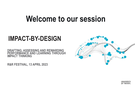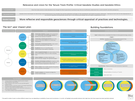2.5 Impact-by-design: Drafting, assessing and rewarding performance and learning through impact thinking
- Mar 2023
- Claartje Chajes
- ·
- Modified Apr 2023
- 2
- 2
- 664
@jeroenjansen, Program manager Recognition and Rewards University of Twente, Coordinator Talent development Faculty od Geo-Information Science and Earth Observation at University of Twente; Joost Teuben, Policy officer capacity development & impact at University of Twente; Wiebke Eberhardt, Strategic policy advisor for research, innovation & impact at University of Twente & Fran Meissner, Assistant Professor Critical Geodata Studies and Geodata Ethics at University of Twente
Universiteit Twente
As a participant in this interactive workshop, you have an important role to develop, think and act along with us about a Theory of Change approach to career development. In a pilot at the University of Twente, aimed towards academia in a career track, people design their individual growth, performance and assessment plans by applying an impact model based on the Theory of Change. These plans focus on their individual learning and performance, but also on their evolvements within the university, amongst other academia and within society as a whole.After sharing our experience with this pilot, three parallel discussion groups will start. One group will be encouraged to reflect on the feasibility, opportunities and barriers of the approach. The second group identifies potential qualitative and quantitative indicators. The third group focuses on the procedural process and enabling conditions required for the organizational embedding of the approach. You are most welcome to join us!


Comments
Here you can read a summary from this workshop (with thanks to the reporter for making it):
The workshop focused on explaining the pilot to assess a career path based on an impact-based Theory of Change model. The audience recognized the puzzle of measuring impact of academics and felt that the Theory of Change can be a helpful tool to rethink assessment but is also considered somewhat complicated. The fact that, next to the tenure tracker, the assessors need training on the model and the way of questioning, resonated well with the audience. An interesting feature of the Theory of Change was that the underlying assumptions of the impact pathway need to be tested constantly. Ena Voûte (pro vice rector of international affairs at TU Delft and former dean) stressed that assumptions were rather implicit before and that the tool makes these explicit, thereby helping our conversations.
It was very much valued that Fran joined to share her experience first-hand.
The responses to the three subgroup questions can be summarized in the following way:
1 – What are the opportunities and barriers of this impact-driven assessment approach?
Opportunities: career portfolio / societal contribution / 360 degrees feedback / future oriented / personalized assessment.
Barriers: takes time / definition of impact / time investment / balance between quantitative score and quality / subjective.
2 – How to evaluate someone’s performance progress and (partially) replace quantitative criteria during the assessment?
Peers & stakeholders involvement / shift from activities to achievements / plan-based and context-based / goal system / reflection on performance progress and strengths / triggers of impact / building a network / list of outcomes / media exposure.
3 – What are the enabling conditions required for the organisational embedding of this assessment approach?
Training on Theory of Change for the assessment committee / guidelines for objectivity / support from management / facilitators for training and coaching / time allocation / autonomy / recognition / agency / mentoring / trust / full understanding of Theory of Change.
Edited on 8 May 2023
@herrienwapstra, @maaikeverbree, @gijsvanderstarre, @maxkusters, @darcojansen, @jeroenjansen, @lyndahardman, @jeroenvanderham, @irisgoedhart, @ymkebresser, @michielbresser, @julmabraat, thank you for joining the workshop! It's a few weeks later now, would you like to share a thought with us about how it inspired you?